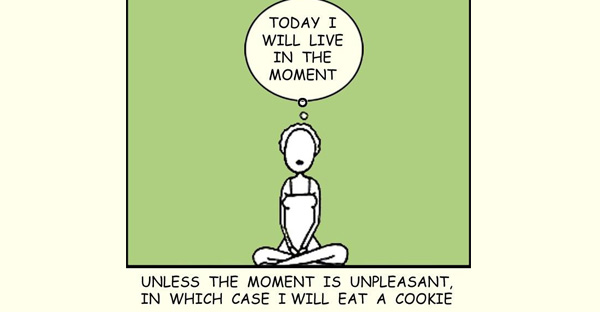

Stress is a normal bodily response and can be life-saving if you need a burst of speed, energy, or alertness to respond to a dangerous situation. When you get stressed, your body enters the so-called “fight-or-flight” mode, increasing the production of certain hormones and shutting down non-essential processes until the stressful event is over.
One of these hormones is cortisol, which suppresses appetite in the short term but can have the opposite effect if it remains chronically elevated.[1] Chronic stress puts your body on constant alert and can lead to a multitude of complications, including overeating.
Signs You’re a Stress Eater
If you respond to stress by eating, you’re not alone. Chronic stress has become an epidemic in the U.S., and the American Psychological Society’s “Stress in America” survey revealed 42 percent of people report being “stress eaters.”[2]
How do you know if stress is driving your urge to snack? You might…
- Eat when you’re not hungry
- Eat more when you feel overwhelmed
- Eat to make yourself feel better
- Think of food as a security blanket in times of stress
- Have difficulty staying away from food when stress levels are high[3]
If you only engage in these behaviors on rare occasions, it’s not likely cause for concern. However, if food is always your go-to when life gets out of control, you could be at risk for serious health problems.
Dangers of Stress Eating
Eating in response to stress can cause physical, mental, and emotional side effects, including:
- Cravings for “comfort foods” high in sugar, salt, and fat
- Weight gain
- Increased insulin and HbA1c levels
- Higher risk of heart disease, diabetes, and other chronic diseases[4]
- Feelings of guilt, shame, or self-hatred
In some cases, stress eating may result from or progress to an eating disorder like bulimia or binge eating disorder (BED).[5] Both disorders involve episodes of uncontrolled eating triggered by a variety of factors, including feeling overwhelmed.
If you routinely find yourself binge eating, experience a deep and lasting sense of self-hatred or shame, or have begun to engage in purging, seek help. These are symptoms of an eating disorder and should be addressed by a professional specializing in these serious conditions.
3 Tips to Stop Stress Eating
You don’t have to live your life controlled by emotional food cravings. Here are three ways you can break the cycle and avoid the consequences of stress eating.
1) Know Your Reasons
If you want food when you’re not hungry, stop and ask yourself why. Do you need to be comforted or relieve anxiety? Are you fidgety and want something to occupy your attention? Are you feeling ignored or like your best efforts are failing? Pinning down the source of your stress can help you find constructive ways to deal with the root cause instead of relying on food as a temporary fix.
2) Know Your Triggers
Certain activities, situations and people can cause undue stress and trigger emotional eating. You may develop an unconscious routine of using food to make yourself feel better after an encounter with one of your triggers.[6] Over time, you come to associate these foods with comfort and the foods themselves may trigger overeating. The best way to address both issues is to make a clean break with as many triggers as you can, including removing problematic foods from the house.
3) Have an Alternate Plan
Knowing in advance how you want to combat stress instead of eating gives you a powerful weapon for fighting emotional triggers. Some common tactics include:
- Engaging in gentle activity like stretching or yoga
- Going for a walk, taking a bike ride, or performing other low-impact exercise
- Calling a supportive friend or family member
- Journaling your thoughts and feelings regarding a stressful event
All of these help you slow down and focus, and exercise in particular can release positive chemicals in your brain while lowering cortisol to dampen the stress response.
Once you learn to recognize your triggers and the real reasons for your stress eating, you can move forward toward a healthier relationship with food.
References
- https://www.health.harvard.edu/newsletter_article/why-stress-causes-people-to-overeat
- https://www.psychologytoday.com/us/blog/the-mindful-self-express/201308/why-we-gain-weight-when-we-re-stressed-and-how-not
- https://www.helpguide.org/articles/diets/emotional-eating.htm
- https://www.ncbi.nlm.nih.gov/pmc/articles/PMC3733123/
- https://www.nationaleatingdisorders.org/learn/by-eating-disorder/bed
- https://www.medicalnewstoday.com/articles/320935.php
Copyright 2026 Center for Nutrition Studies. All rights reserved.
Deepen Your Knowledge With Our
Plant-Based Nutrition
Certificate
Plant-Based Nutrition Certificate
- 23,000+ students
- 100% online, learn at your own pace
- No prerequisites
- Continuing education credits






